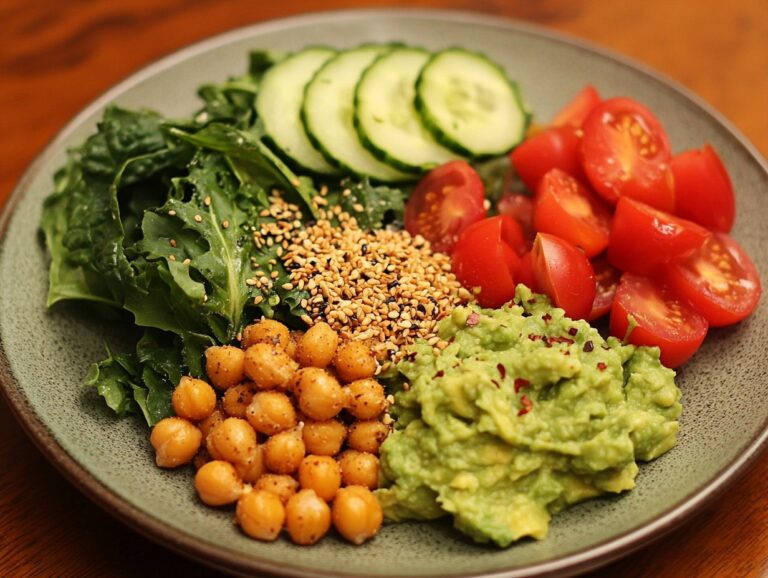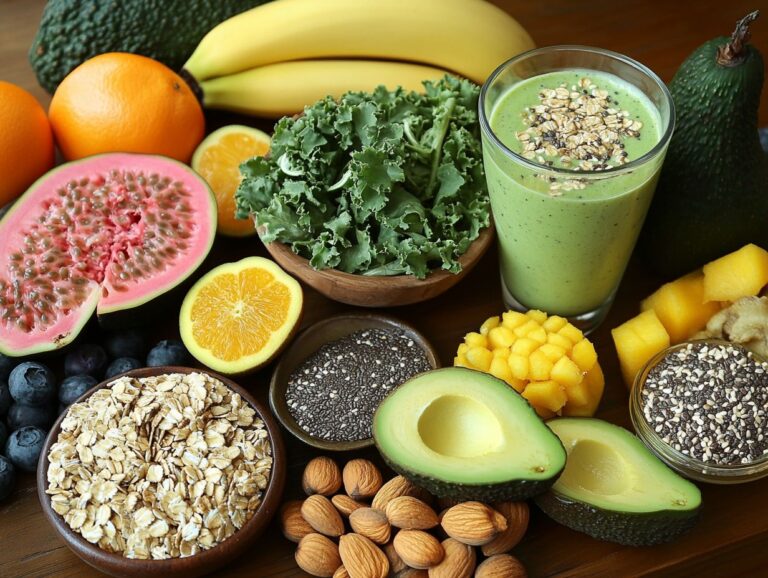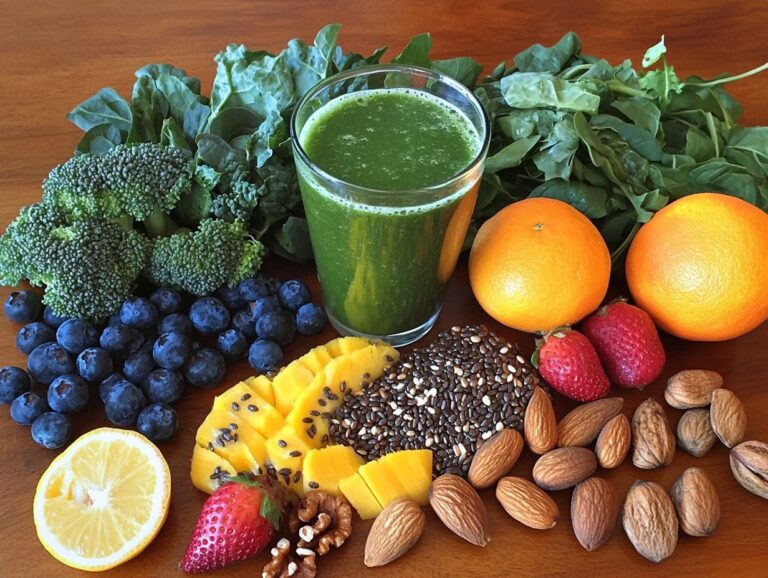An alkaline vegan diet emphasizes the consumption of nutrient-dense, plant-based foods that help maintain a healthy pH balance in the body. This type of vegan diet is believed to offer benefits such as increased energy and improved digestion. In this article, we will explore the advantages of an alkaline vegan diet, the foods you can include, the foods you should avoid, and some simple ideas for integrating these foods into your daily meals.
Why Should You Consider an Alkaline Vegan Diet?
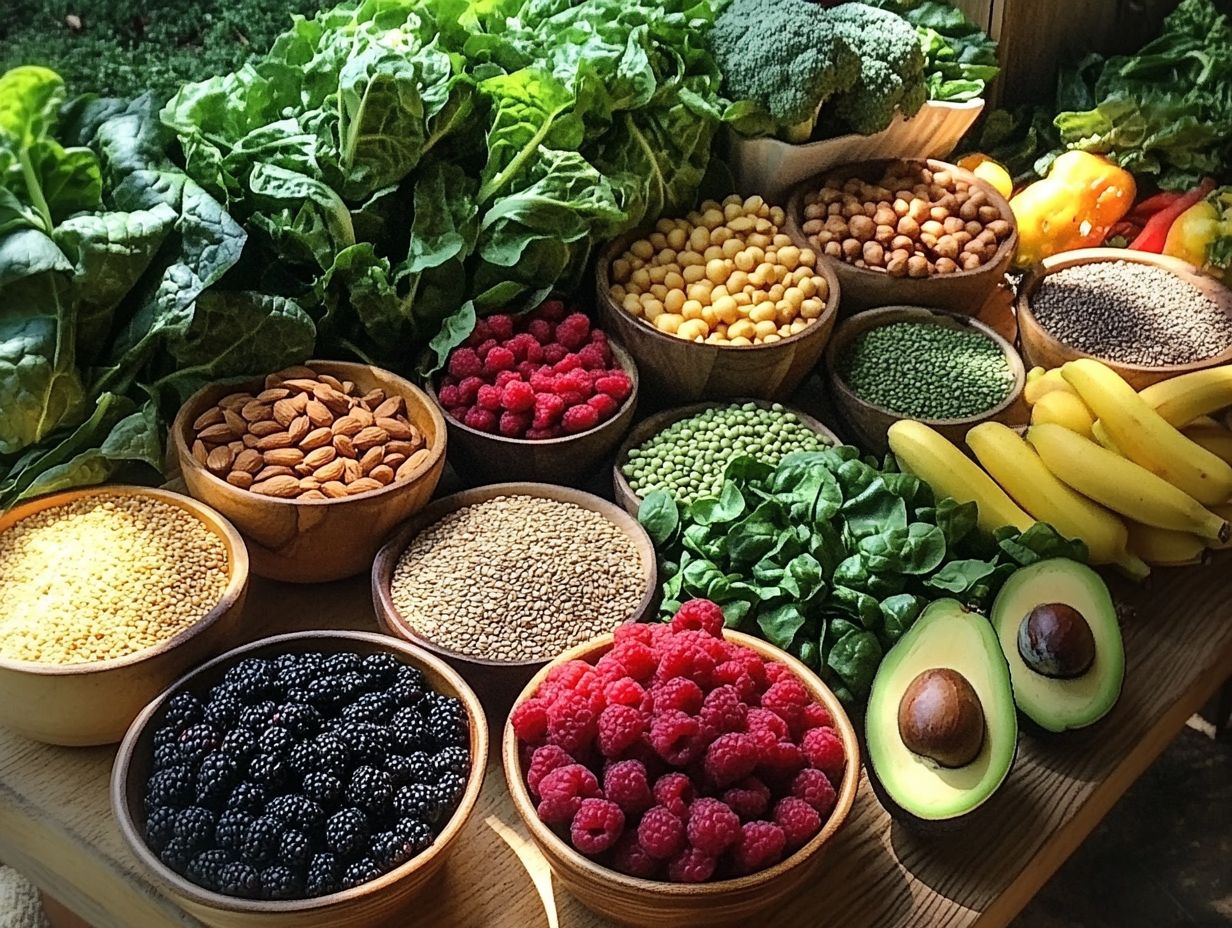
The alkaline vegan diet is a dietary approach designed to help individuals achieve optimal health and wellness. Popularized by Dr. Sebi, whose real name is Alfredo Darrington Bowman from Honduras, this natural alkaline diet emphasizes the consumption of alkaline plant-based foods while avoiding certain prohibited foods that may pose health risks.
Adopting an alkaline diet offers numerous health benefits, including improved pH balance, increased energy, and weight loss. It also encourages lifestyle changes that aid in the prevention of chronic diseases and promote a sustainable diet rich in essential vitamins and minerals. Furthermore, aligning this approach with a nutritional guide can help bridge nutritional gaps and promote dietary habits that support longevity.
What Are the Benefits of an Alkaline Vegan Diet?
The benefits of an alkaline vegan diet are extensive and often interconnected, with most of them focused on the concepts of detoxifying the body and enhancing overall health. An alkaline vegan diet reduces the production of excess mucus, which is linked to many chronic diseases, such as bronchitis and pneumonia.
It also promotes healthier eating habits by encouraging the consumption of nutrient-rich and unprocessed foods. Adhering to a nutritional guide that emphasizes alkaline foods can significantly enhance one’s overall health and reduce the risk of various diseases.
Moreover, a vegan alkaline diet plays a crucial role in disease prevention, particularly in lowering the risk of hypertension, diabetes, and certain cancers. A diet rich in minerals and antioxidants helps balance the body’s pH levels, which can alleviate inflammation.
Alkaline foods facilitate the detoxification process, enabling the body to more effectively eliminate toxins that contribute to disease. This not only restores energy levels but also ensures optimal organ function, creating an internal environment that promotes longevity and vitality.
What Foods Are Allowed on an Alkaline Vegan Diet?
An alkaline vegan diet comprises foods that help maintain the body’s ideal pH balance. This diet includes alkaline foods such as:
- Alkaline vegetables
- Whole grains
- Legumes
- Nuts
- Seeds
- Healthy fats
All of which are rich in essential vitamins and minerals. Additionally, herbal teas are often included in this diet. Selecting the right plant-based foods is crucial for promoting a healthy lifestyle and ensuring overall well-being.
1. Leafy Greens
Leafy greens are a vital component of the alkaline vegan diet and offer numerous nutritional benefits. Foods such as kale, spinach, and collard greens are rich in important vitamins and minerals, including iron and vitamin K, which support proper bodily functions and help prevent nutritional deficiencies. Incorporating these nutrient-rich foods can also aid in filling nutritional gaps that may occur in a strict vegan diet.
Additionally, Swiss chard and arugula are two other leafy greens that provide significant nutritional advantages. Swiss chard is abundant in magnesium, which is essential for muscle and nerve function, while arugula is a good source of antioxidants that support the detoxification process.
By incorporating these greens into smoothies, soups, or as a base for flavorful salads, those following an alkaline vegan diet can enhance their meals and enjoy the associated alkaline benefits.
2. Cruciferous Vegetables
Cruciferous vegetables, such as broccoli and cauliflower, play a crucial role in an alkaline vegan diet due to their detoxifying properties and numerous health benefits. These vegetables are rich in fiber, vitamins, and minerals, all of which are essential for maintaining a healthy immune system and digestive system.
Along with broccoli and cauliflower, other members of the cruciferous family include:
- Kale
- Brussels sprouts
- Cabbage
Each offering unique advantages. For instance, kale is high in antioxidants that neutralize free radicals, while Brussels sprouts are abundant in glucosinolates, which provide anti-cancer properties. These vegetables are highly versatile and can be incorporated into hearty soups or roasted with spices to create flavorful side dishes.
The variety of cruciferous options allows individuals to increase their intake of sulfur-containing compounds, which are particularly beneficial for liver detoxification and can help establish a strong defense against chronic illnesses, such as heart disease and certain cancers.
3. Fruits
Fruits play a vital role in the alkaline vegan diet, offering numerous health benefits due to their high fiber and vitamin content. Alkaline fruits such as avocados, bananas, and berries serve as healthy alternatives for satisfying sweet cravings while aiding digestion and helping the body maintain a balanced pH.
These fruits are rich in antioxidants, which are essential for reducing oxidative stress and inflammation. For instance, avocados provide healthy fats that enhance nutrient absorption, while bananas are an excellent source of potassium, promoting heart health.
Additionally, berries are low on the glycemic index and high in fiber, which can assist with weight maintenance. Incorporating these colorful fruits into the daily diet—whether in smoothies, salads, or as quick snacks—is an effective way to nourish the body and support overall health and wellness.
4. Whole Grains
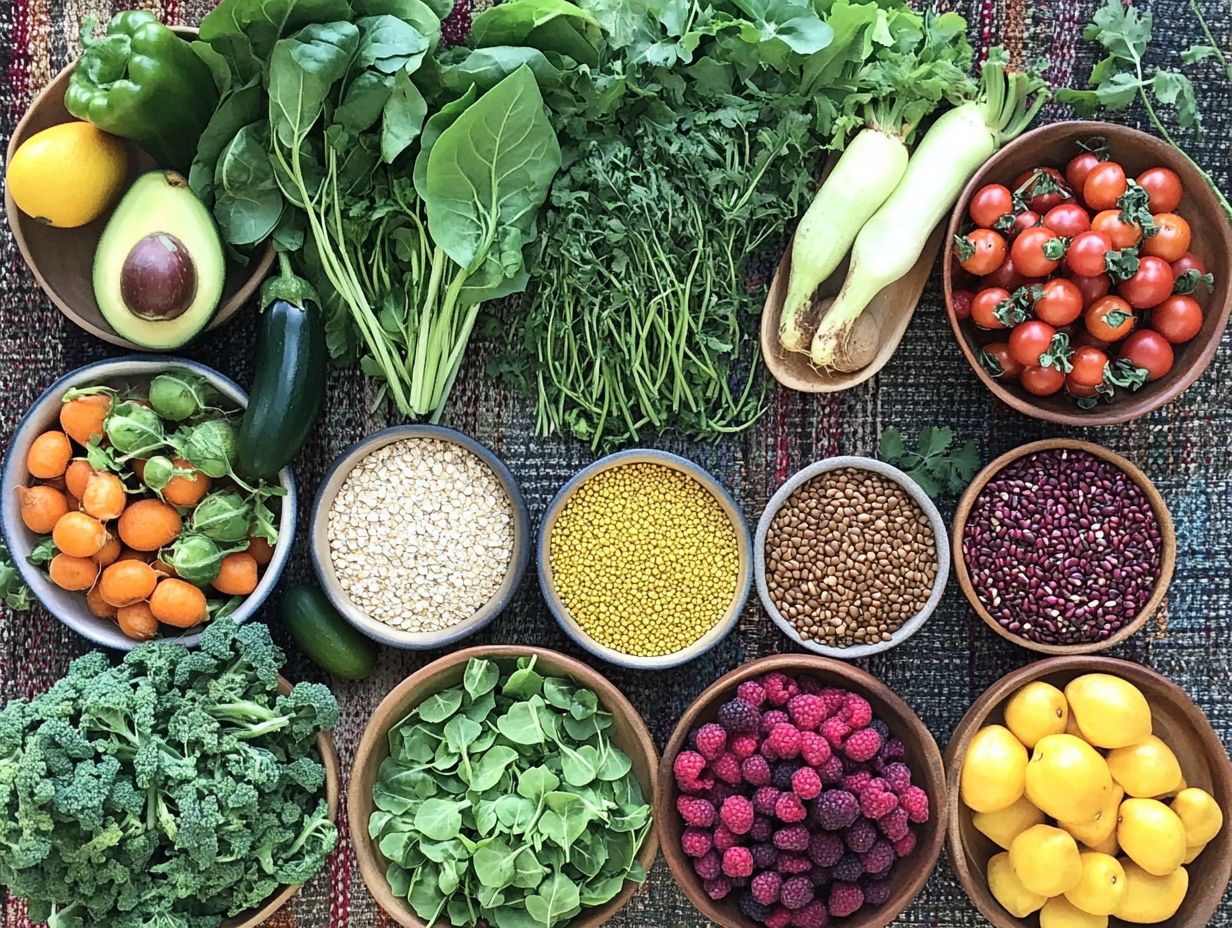
Whole grains are a valuable component of the alkaline vegan diet, offering essential nutrients and fiber that promote a healthy digestive system. Foods such as quinoa, amaranth, and brown rice not only support pH balance but also help maintain energy levels and prevent nutritional deficiencies. These grains are an important part of a balanced diet, fitting within the parameters of other well-known dietary approaches like the Mediterranean diet and French diet, emphasizing diverse food sources and portion control.
These whole grains are rich in vitamins, minerals, and antioxidants, which play a crucial role in reducing inflammation and lowering the risk of chronic diseases, including heart disease and type 2 diabetes.
Renowned for their high fiber content, they aid digestion and help regulate blood sugar levels, making them an ideal choice for those looking to enhance their overall health.
Incorporating a variety of whole grains into the diet not only adds diversity to meals but also ensures a well-rounded intake of essential nutrients, ultimately contributing to a balanced and health-promoting lifestyle.
5. Legumes
Legumes, including beans and lentils, are a fundamental component of an alkaline vegan diet, providing an excellent source of protein and fiber. These nutrient-dense foods help ensure a balanced diet while promoting weight loss and enhancing digestion.
They are rich in essential vitamins and minerals, such as iron, potassium, and folate, which contribute to overall bodily function. Their high fiber content increases the feeling of fullness, making them a great alternative for those aiming to manage their weight.
Some of the most well-known legumes include:
- Lentils
- Beans
- Peas
- Soybeans
Incorporating legumes into meals is easy and versatile; they can be added to salads, soups, or stews, or enjoyed as a spread, such as hummus. This versatility makes legumes an important dietary staple for anyone looking to improve their nutrition.
6. Nuts and Seeds
Nuts and seeds are nutrient-dense foods rich in healthy fats that can be effectively incorporated into an alkaline vegan diet. For example, almonds, chia seeds, and flaxseeds not only enhance the flavor of various dishes but also provide essential vitamins and minerals that support proper bodily function.
Walnuts are particularly beneficial as they are a great source of omega-3 fatty acids, which are vital for cardiovascular health. Additionally, pumpkin seeds are high in magnesium and zinc, nutrients that boost immunity and promote bone health.
Brazil nuts are an excellent source of selenium, an important mineral for antioxidant defense. By incorporating these nutrient-dense foods into your daily meals, you can improve both the taste and texture of your dishes while supplying your body with the essential micronutrients needed to maintain a balanced alkaline diet.
7. Healthy Fats
Incorporating healthy fats into an alkaline vegan diet is essential for maintaining overall health and wellness. Foods such as avocados and olive oil provide not only essential fatty acids but also contribute to a well-rounded nutritional profile that supports heart health and helps prevent chronic diseases.
These healthy fats play a significant role in the absorption of fat-soluble vitamins A, D, E, and K, which are vital for various bodily functions. Including sources like nuts, seeds, and fatty fish can greatly enhance cardiovascular health by reducing inflammation and improving cholesterol levels.
For example, omega-3 fatty acids found in flaxseeds and walnuts are particularly beneficial for protecting against heart disease. Achieving the right balance of healthy fats nourishes the body and serves as a sustainable energy source, aligning the alkaline diet with long-term wellness goals.
8. Herbal Teas
Herbal teas are an excellent addition to the alkaline vegan diet, as they aid in detoxifying the body and offer numerous health benefits. These teas are particularly popular among those following celebrity diets or seeking natural remedies for chronic health conditions.
Two notable herbal teas, dandelion and sarsaparilla, are known for promoting improved digestion and better nutrient absorption. Other herbal infusions, such as peppermint and ginger, also contribute to overall wellness by supporting immune function and reducing inflammation, which aligns with a health-conscious lifestyle.
Peppermint tea is refreshing and helps alleviate digestive discomfort while providing a soothing cooling effect. In contrast, ginger tea is a powerful anti-inflammatory that calms the digestive tract and supports the immune system. These herbal teas offer significant health benefits and are key components of an alkaline diet.
Incorporating herbal tea into your daily routine is simple; it can be enjoyed in the morning as a wake-up beverage or in the evening as a calming drink before bedtime. This practice not only enhances the alkaline vegan diet but also aligns seamlessly with the principles of an alkaline lifestyle. This dietary habit can also aid in weight loss and overall detoxification of the body.
What Foods Should Be Avoided on an Alkaline Vegan Diet?
An alkaline vegan diet emphasizes the elimination of certain foods that can pose health risks and disrupt the body’s natural pH balance. The Dr. Sebi diet, formulated by Dr. Sebi (Alfredo Darrington Bowman) from Honduras, is a well-known example of an alkaline diet that targets health improvement.
This diet restricts the consumption of meat, dairy products, processed foods, refined sugars, caffeine, and alcohol, as these items have been associated with inflammation, excess mucus production, and various chronic health issues such as bronchitis, pneumonia, and diabetes.
1. Meat and Dairy Products
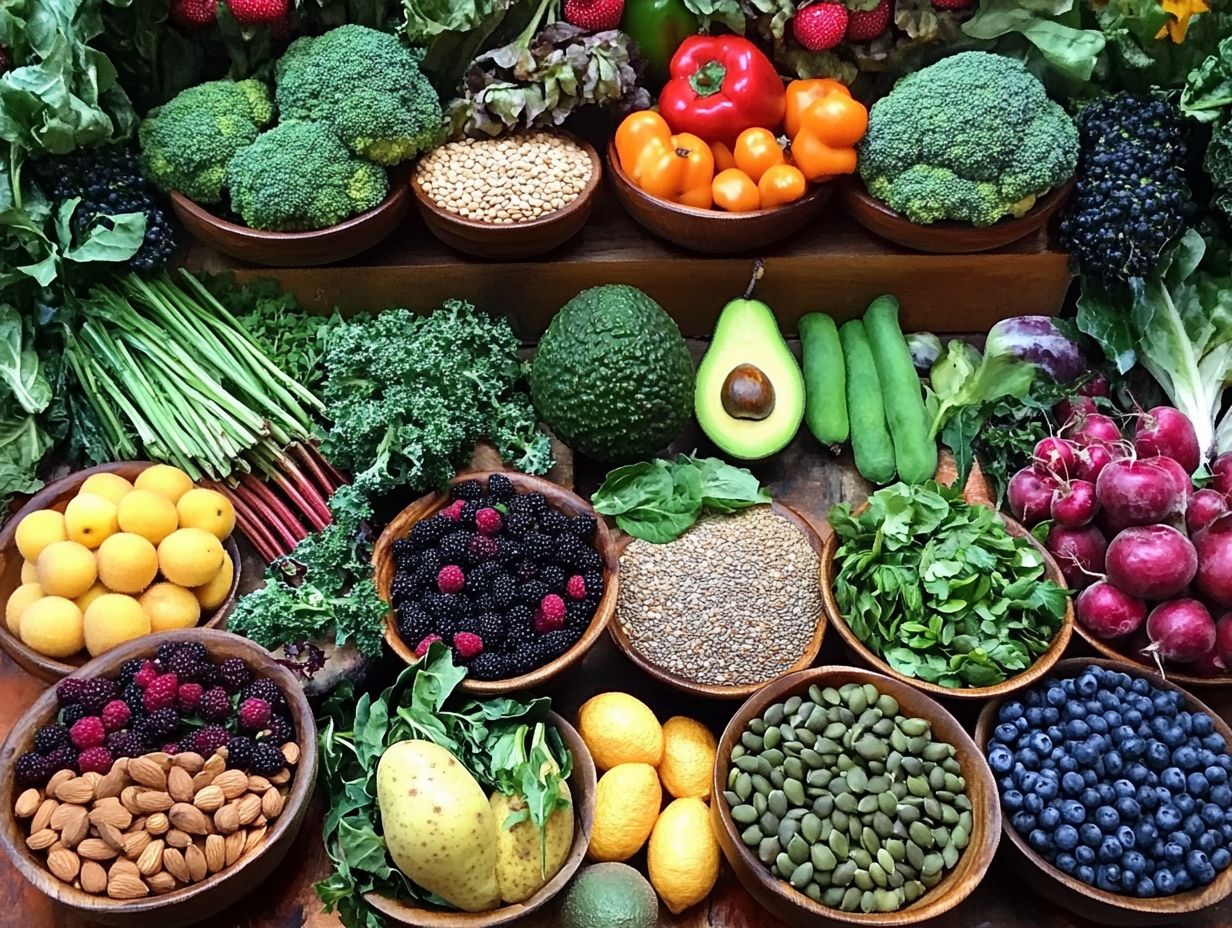
In an alkaline vegan diet, it is important to avoid meat and dairy products due to their association with health problems and inflammation. These foods can be harmful when consumed frequently over the long term, particularly for individuals who lack the appropriate genetic predispositions, as they can disrupt the body’s pH balance and contribute to chronic health issues. Avoiding these prohibited foods can help manage and prevent diseases like kidney disease and cancer.
Research indicates that a high intake of animal-based foods can lead to increased acidity in the body, which may trigger inflammatory reactions. This imbalance can elevate the risk of conditions such as arthritis, cardiovascular diseases, and other chronic health conditions, while also interfering with the body’s natural detoxification processes.
An alkaline diet helps maintain pH levels within the normal range and supports overall immune function. For those looking to improve their diet’s pH, the long-term benefits of eliminating meat and dairy will reinforce their commitment to the alkaline vegan diet’s core principles, which focus on reducing inflammation and prioritizing plant-based foods. Incorporating natural alkaline foods such as amaranth, quinoa, kale, burdock root, and sarsaparilla can further enhance these health benefits.
2. Processed Foods and Refined Sugars
Processed foods and refined sugars can be detrimental to an alkaline vegan diet, leading to negative health outcomes and nutritional deficiencies. These types of food often contain additives and preservatives that can adversely affect overall health. Additionally, they lack essential vitamins and minerals, contributing to nutritional gaps and deficiencies.
Their consumption is linked to higher levels of inflammation and an increased likelihood of chronic diseases such as obesity and diabetes. Individuals who are accustomed to eating these foods may struggle to maintain a healthy body weight or achieve optimal energy levels throughout the day. The Dr. Sebi nutritional guide emphasizes the avoidance of these harmful food sources and promotes a sustainable diet rich in alkaline vegetables.
Additionally, processed options are typically low in micronutrients, which can lead to cravings for further unhealthy foods, perpetuating the cycle. Therefore, it is essential for those following an alkaline lifestyle to prioritize whole, unprocessed foods, which promote better digestion and optimal vitality while mitigating the unhealthy effects of refined sugars and industrially produced snacks. This shift in dietary habits also supports long-term weight management and disease prevention.
3. Caffeine and Alcohol
On an alkaline vegan diet, it is advisable to avoid caffeine and alcohol due to their potential negative effects on pH balance and overall health. Both substances can contribute to inflammation and disrupt the body’s natural processes. Avoiding caffeine and alcohol is crucial for those aiming to achieve dietary preferences that boost their health claims and overall wellness.
Although caffeine typically does not directly affect pH levels, regular consumption of caffeinated beverages may result in increased acidity. This heightened acidity can lead to digestive issues and place additional stress on the adrenal glands. For those with preexisting conditions like adrenal fatigue or other chronic health conditions, avoiding caffeine can significantly improve their health.
Alcohol, known for its dehydrating properties, significantly impairs the liver’s ability to detoxify the body. This impairment can cause a buildup of toxins and lead to increased inflammation. Reducing alcohol consumption is part of adopting a healthy lifestyle that includes an alkaline vegan diet and routine physical activity.
How to Incorporate Alkaline Vegan Foods into Your Diet?
Incorporating alkaline vegan foods into your diet can be achieved by implementing some simple meal preparation and food selection strategies.
By gradually introducing these foods into your daily meals, you can ensure that the changes are manageable while keeping your meals both delicious and nutritious. This approach aligns with successful dietary changes often observed in the French diet and other balanced diet practices.
1. Start Slowly
It is essential to start slowly when incorporating alkaline vegan foods into your diet. This gradual approach allows your body to adjust to dietary changes without experiencing shock from introducing too many new foods too quickly.
By adding one or two alkaline foods at a time, you can transition your eating habits more naturally. For instance, you might begin by replacing dairy products with almond or cashew milk, both of which are alkaline and offer healthy nutrient profiles.
Additionally, incorporating dark leafy greens such as spinach or kale into your meals is a great way to enhance nutritional value while gradually phasing out more acidic food options. This method of introducing alkaline vegan foods makes it easier to adjust your daily eating habits and can also enhance digestion and energy levels. These alkaline vegetables are also rich in fiber content, aiding in better digestion and overall health.
2. Experiment with Recipes
Experimenting with recipes is a fun way to incorporate alkaline vegan foods into meals. This experimentation allows for creativity in the kitchen while still meeting dietary needs.
Trying different cooking methods can introduce new flavors and textures, making healthy eating enjoyable. One effective technique is to marinate vegetables such as zucchini and bell peppers in a mixture of alkaline ingredients like lemon juice and tamari before grilling them, which enhances their natural sweetness. This practice, observed in various food cultures including Mediterranean diet, can help diversify your meals and incorporate more nutrient-rich foods.
Additionally, adding spinach or kale to smoothies with alkaline fruits like bananas creates a refreshing breakfast option that is both delicious and energizing. Roasting root vegetables like sweet potatoes or carrots allows them to develop a delightful caramelization, providing a satisfying contrast when tossed into salads with a sprinkle of nuts. These culinary customs can transform your diet by incorporating more alkaline foods and avoiding harmful food additives.
These techniques demonstrate the versatility of alkaline ingredients and transform meal preparation into an enjoyable culinary experience. They also align with the principles of Dr. Sebi’s diet, which emphasizes the consumption of alkaline and plant-based foods to promote optimal health.
3. Plan Your Meals
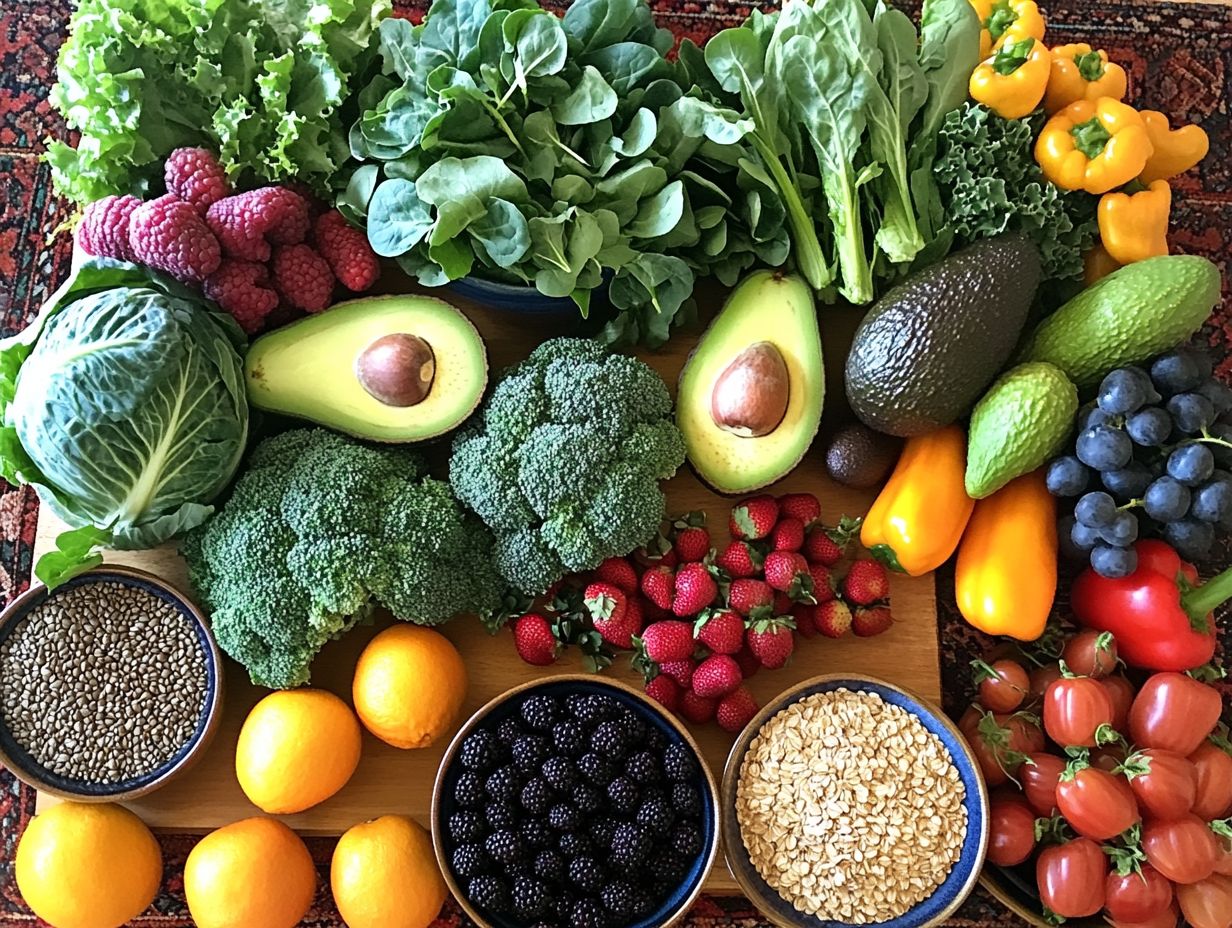
Meal planning is an essential strategy for incorporating alkaline vegan foods into your regular diet, as it ensures you have the right ingredients on hand for your meals. This planning helps bridge nutritional gaps and supports your daily physical activity with nutrient-rich foods.
By dedicating time to plan your meals, you can guarantee that you are consuming well-balanced dishes that meet your dietary needs. This process begins with identifying ingredients that are high in alkalinity, such as leafy greens, avocados, nuts, and seeds, while also recognizing those that are overly processed. This thoughtful food selection contributes to disease prevention and the promotion of a healthy lifestyle.
A well-structured meal plan allows individuals to experiment with various combinations of healthy foods, whether it’s a quinoa salad with colorful peppers and a lemon juice dressing or a hearty vegetable stew. Not only do these meal combinations align with the principles of an alkaline vegan diet, but they also reflect the diversity seen in meals in France, which emphasize balance and variety.
Preparing healthy snacks, such as hummus and vegetable sticks, can also help maintain healthy eating habits between meals, provided you set aside time each week for preparation. These snacks can support social eating and help you stay committed to your dietary goals.
In summary, meal planning can ensure that your body receives proper nutrition, positively impacting overall health while allowing for a diverse and varied vegan menu.
4. Listen to Your Body
Listening to your body is essential when following an alkaline vegan diet, as it enables you to identify which foods make you feel your best. This mindfulness can prevent food allergies and help you cater to your specific dietary preferences.
Being mindful of how different foods impact your energy levels and mood can lead to healthier choices. This awareness fosters a deeper understanding of how foods affect your body, allowing you to optimize your diet with ingredients that energize rather than deplete you. For instance, choosing natural alkaline foods over processed options can significantly enhance your vitality and well-being.
For instance, you may notice that consuming leafy greens makes you feel lighter and more energized, while eating processed foods leaves you feeling tired.
This mindful relationship with food can improve digestion, reduce bloating, and promote clearer thinking and emotional stability.
What Are Some Tips for Maintaining an Alkaline Vegan Diet?
Maintaining an alkaline vegan diet can be challenging, but there are tips and tricks to simplify the process and make it more enjoyable.
Staying hydrated and monitoring your pH levels at home are two essential practices that can help ensure a healthy experience while preventing nutrient deficiencies.
1. Stay Hydrated
Hydration is crucial for the alkaline diet as it aids in detoxification. Drinking an adequate amount of water helps maintain the body’s pH balance and reduces the concentration of toxins. Herbal teas and water infused with lemon and/or mint can serve as excellent alternatives to help you stay hydrated.
For individuals following a plant-based diet, it is commonly recommended to consume 8 to 10 cups of water daily, depending on personal activity levels and climatic conditions. This practice is also emphasized in celebrity diets, where hydration is key to maintaining a healthy and glowing appearance.
Additionally, foods high in alkaline content, such as cucumbers, celery, and watermelon, not only keep you hydrated but also provide essential nutrients that promote overall health. These foods are rich in vitamins and minerals, making them excellent for preventing nutritional deficiencies.
Herbal teas and water infused with lemon and/or mint can serve as excellent alternatives to help you stay hydrated. Adhering to general hydration guidelines reinforces the principles of an alkaline vegan diet, enhancing the body’s capabilities and fostering a healthy lifestyle. This practice is also observed in the Mediterranean diet, known for its emphasis on hydration and balanced nutrition.
2. Monitor Your pH Levels
Monitoring your pH levels is a valuable practice when following an alkaline diet, as it allows you to track your body’s condition and adjust your diet accordingly. Understanding how your food choices influence your pH can promote overall health and wellness.
By measuring pH levels regularly, you can determine whether your diet is effectively maintaining an alkaline state, which is essential for preventing issues associated with high acidity levels. Accepted methods for measuring pH include using pH test strips, digital meters, or urine tests. These tools can help you make informed decisions about your dietary habits and adjustments.
Maintaining an appropriately alkaline environment in the body contributes to improved organ function, enhanced nutrient absorption, and a stronger immune response. To achieve the desired pH level, incorporating foods such as leafy greens, nuts, and legumes into your diet can be beneficial while also enhancing overall vitality.
Balancing your pH levels can significantly impact your energy levels, mental clarity, and overall health.
3. Get Enough Nutrients
An alkaline vegan diet can lead to nutritional deficiencies if not properly planned, making it essential to ensure adequate nutrient intake.
To achieve this goal, it is important to consume a wide variety of foods rich in vitamins and minerals. Daily meals should include a diverse selection of fruits, vegetables, nuts, seeds, and whole grains to maintain a balanced nutrient profile.
- Leafy greens, such as kale and spinach, which are high in calcium, should be incorporated, along with protein sources like legumes and quinoa.
- Additionally, it is crucial to monitor vitamin B12 levels, as this vitamin can be deficient in a strictly vegan diet; fortified foods or supplements may be beneficial.
Regular consultations with a healthcare professional can help ensure that individual nutritional needs are met while reaping the benefits of an alkaline diet.
4. Consider Supplementation
Supplementation on an alkaline vegan diet can be beneficial for individuals who struggle to meet their dietary needs. These supplements may include vitamins and minerals that are often lacking in a balanced diet, ensuring individuals receive all the necessary nutrients for proper bodily function.
For instance, vitamin B12 is crucial for the development and functioning of brain and nerve cells, but it is not present in plant foods, making supplementation essential. Calcium and vitamin D are vital for bone health, and these nutrients are primarily found in dairy products, which alkaline vegans do not consume in sufficient amounts.
Although iron is available in plant sources, the body does not absorb it as effectively as heme iron from meat, which can lead to deficiencies in many non-meat eaters. Omega-3 fatty acids, which are abundant in fish and seafood, are important for improving brain health and reducing inflammation. Therefore, alkaline vegans may consider supplementing their diet with these key nutrients as needed.


